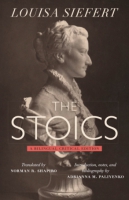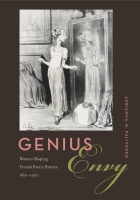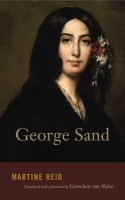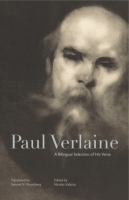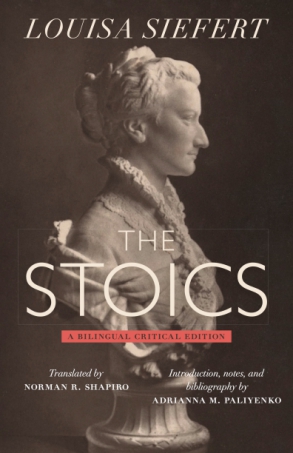
The Stoics
A Bilingual Critical Edition
Louisa Siefert, translated by Norman R. Shapiro, and with an introduction, notes, and bibliography by Adrianna M. Paliyenko
The Stoics
A Bilingual Critical Edition
Louisa Siefert, translated by Norman R. Shapiro, and with an introduction, notes, and bibliography by Adrianna M. Paliyenko
“This edition of Les Stoïques makes an important literary work accessible to audiences of varying levels of French and English and advances our knowledge of nineteenth-century poetry in important ways. In particular, it reconstitutes the original context in which Siefert wrote and the response her work received within poetic circles and within her world.”
- Description
- Reviews
- Bio
- Table of Contents
- Sample Chapters
- Subjects
“This edition of Les Stoïques makes an important literary work accessible to audiences of varying levels of French and English and advances our knowledge of nineteenth-century poetry in important ways. In particular, it reconstitutes the original context in which Siefert wrote and the response her work received within poetic circles and within her world.”
“Paliyenko and Shapiro provide readers with the opportunity to discover an underrated yet gifted nineteenth-century French poet in a bilingual edition that is powerfully supported by the introduction, notes, and bibliography. The Stoics situates itself within a vibrant movement to rediscover and reassess female writers, and the case is eloquently made for a revision of Siefert’s position in the canon.”
Adrianna M. Paliyenko is Arnold Bernhard Professor in Arts and Humanities at Colby College. She is the author of Genius Envy: Women Shaping French Poetic History, 1801–1900 and the editor of volumes on nineteenth-century French women writers Madame A. Cashin, Anaïs Ségalas, Marie Krysinska, and Louisa Siefert.
A Note About the Translator
Acknowledgments
Reading Les Stoïques Anew
THE STOICS (1870)
Dédicace / Dedication
Le Départ / Leaving
Au large / At Sea
Soupir / Sighs
Immortalité / Immortality
Lune d’avril / April Moon
Jour tombant / Dying Day
Bonheur / Happiness
La Combe / The Valley
Automnales / Autumnalia
Soir d’hiver / Winter Eve
Les Vieilles Gens / The Old Folks
“Tous les rires d’enfant ont les mêmes dents blanches . . .” / “The same white gleam in all children’s laughter . . .”
“Il sera grand & fort, il est déjà si tendre . . .” / “Tall and strong will he be, so gentle too . . .”
“Pour ce petit enfant tant d’espoirs & d’alarmes . . .” / “For this babe, so much hope, so many fears . . .”
“Ce soir, quand la ville engourdie . . .” / “This evening, when the town, chilled numb . . .”
“Car, ô pauvres parents navrés . . .” / “For, O poor parents, when child dies . . .”
Au long des quais / Along the Embankments
Le Premier Froid / The First Chill
À ce qui n’est plus / For What Exists No More
“L’orage a passé; mais les flots sont durs . . .” / “The storm is past; still, the waves brutally . . .”
Sotto voce / Sotto voce
Chanson triste / Sad Song
“Et je pense à la mort, & toujours cette idée . . .” / “And so I think of death; ever that thought . . .”
Temps perdu / Time Lost
“La tristesse a vaincu, je souffre & je me tais . . .” / “Sadness has won, silent my suffering . . .”
Promenade d’automne / Autumn Stroll
“Jadis enfant joyeuse & folle . . .” / “A child was I, gay, undeterred . . .”
“Ô privilèges saints que Dieu m’accorde encor . . .” / “O sacred favors God yet grants to me . . .”
“Inutile! ce mot pèse sur bien des fronts . . .” / “‘Useless’? Word that weighs hard on many a brow . . .”
“L’amour! un mot encor, mais sublime & sauvage . . .” / “‘Love’! Simple word . . . One that—savage, sublime . . .”
“Un cimetière aux champs est chose rassurante . . .” / “A country graveyard comforting appears . . .”
“Je ne puis feuilleter mes livres, mon trésor . . .” / “Scarce can I leaf through treasured books, than there . . .”
“C’est vrai, j’ai peu d’égards aux vains regrets d’autrui . . .” / “True it is, I care little for the ills . . .”
Sur la première page de Joseph Delorme / On the Title Page of Joseph Delorme
La Divine Tragédie / The Divine Tragedy
Le Sacrifice d’Abraham / Abraham’s Sacrifice
“Le ciel est sombre, il pleut, &, la tête lassée . . .” / “The sky is dark with rain. My brow, distraught . . .”
La Pierre d’attente / Marianne’s Bust
“À l’honneur du combat qu’importe la victoire . . .” / “What matters victory to combat’s course . . .”
“Ô morts qui ressemblez à des apothéoses . . .” / “O you, apotheosis-like dead souls . . .”
“Quand Jésus s’en allait de bourgade en bourgade . . .” / “When Jesus went from town to town . . .”
Épilogue / Epilogue
Appendix: Selected Pages from Louisa Siefert’s Papers
Notes
Bibliography
Index of Poems
General Index
Download a PDF sample chapter here: Introduction
Mailing List
Subscribe to our mailing list and be notified about new titles, journals and catalogs.
